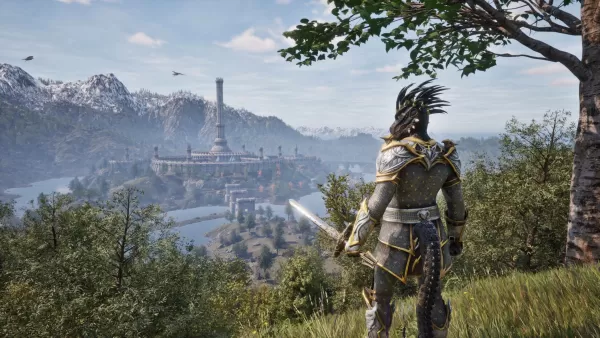By Azura, by Azura, by Azura – the rumors were true. Yesterday, Bethesda set the gaming world ablaze by unveiling Virtuos’ remaster of The Elder Scrolls IV: Oblivion. This unexpected reveal during an 'Elder Scrolls Direct' event led to a shadow-drop that saw hundreds of thousands of players diving in almost instantly. This surge of excitement and celebration comes at a critical time for Bethesda Game Studios, which has faced its share of challenges in recent years. From managing the fallout of Fallout 76's rocky start to the lukewarm reception of their new sci-fi venture, Starfield, many fans have been questioning whether Bethesda still holds the magic that once defined it. With fierce competition from RPGs like Larian Studios’ Baldur’s Gate 3 and Obsidian’s The Outer Worlds, which have been praised as spiritual successors to Elder Scrolls and Fallout, Bethesda's upcoming titles like Elder Scrolls 6 and Fallout 5 are still years away. Yet, this re-release of Oblivion might be the unexpected move that helps them regain their footing.
At its zenith, Bethesda was a powerhouse in the RPG genre. In 2020, Microsoft's leaked FTC documents revealed that Fallout 4 had sold 25 million units, with over 5 million units sold in its first week alone according to VGChartz. In 2023, Todd Howard announced that Skyrim had surpassed 60 million sales, bolstered by numerous re-releases. In contrast, Starfield's sales estimates stand at just over three million units a year-and-a-half post-launch. Even with Game Pass boosting player numbers and the absence of a PlayStation version, these numbers might be disappointing for Bethesda. Despite having a dedicated fanbase, Starfield's community is smaller than that of The Elder Scrolls or Fallout, and even they have expressed dissatisfaction with the game's first expansion, Shattered Space.
This situation presents a significant challenge for Bethesda. With The Elder Scrolls 6 and Fallout 5 still years away, how can this iconic RPG developer rekindle the passion of its fanbase? The answer may lie in revisiting its storied past.
Rumors of the Elder Scrolls IV: Oblivion remaster surfaced in September 2023, following leaks from Microsoft documents that hinted at several unannounced Bethesda projects, including a remaster of the 2006 classic. The buzz grew until January 2025, when a former Virtuos employee leaked more details, sparking debates among fans about the remaster's authenticity. The official reveal last week, though premature, ignited the internet – Google searches for ‘The Elder Scrolls IV: Oblivion’ surged by 713% in the last week, reaching over 6.4 million. Bethesda's reveal livestream peaked at over half a million viewers, and despite the leaks, over 600,000 tuned in to see the 19-year-old game reintroduced. The demand was so intense that it caused discount game key websites like CDKeys to crash, while Fanatical and Green Man Gaming struggled to keep up. As of yesterday, Steam reported 125,000 concurrent players, with the game topping the best-seller list. The enthusiasm for Oblivion among Bethesda fans is as intense as the flames from the Oblivion gates themselves.
The message from players is clear: if you (re)build it, they will come. What better way to keep fans engaged during these long development cycles than to invite them back to the enchanting worlds of Morrowind or the post-apocalyptic landscapes of the East Coast? From a business perspective, this strategy is sound. While Bethesda's main team works on new projects, trusted partners like Virtuos can use existing blueprints to create remasters more quickly. These remasters tap into established fanbases and introduce new generations to the rich lore of Tamriel or the gritty survival of the Fallout universe.
Bethesda has successfully leveraged its catalog before. During the first season of the Fallout TV show on Prime Video, Fallout 4 was discounted by up to 75%, accompanied by a timely next-gen update that included nods to the show. As a result, Fallout 4 sales in Europe surged by over 7,500%, despite the game being nearly a decade old.

Looking back at Microsoft’s leaked Bethesda roadmap, a Fallout 3 remaster was slated to follow Oblivion two years later. Although the original timelines have shifted – Oblivion was initially planned for fiscal year 2022 – if the gaps remain consistent, a Fallout 3 remake could be expected in 2026, aligning with the second season of the Fallout TV show. Given the show's focus on New Vegas in its second season, could Bethesda be planning a surprise New Vegas remake? The synergy between the show's first season and Fallout 4's aesthetic suggests that Bethesda might be planning something even more ambitious for the New Vegas-centric second season. After shadow-dropping Oblivion, it's not far-fetched to think a New Vegas Remastered trailer might be waiting at the end of Fallout Season 2's finale.
The message from players is clear: if you (re)build it, they will come. However, if there's one game in Bethesda's catalog that truly deserves a remake, it's The Elder Scrolls III: Morrowind. Fans have been clamoring for this for years, with some even remaking it using Skyrim's tools, as seen in projects like Skyblivion. Yet, Morrowind poses unique challenges. It stands at the crossroads of Bethesda's evolution, built differently from modern Elder Scrolls games. It's only partially voiced, relies heavily on text for storytelling, lacks quest markers, and has simplistic combat physics. While Virtuos managed to update some of Oblivion's systems, Morrowind's entire framework is a complex system. It's what makes the game beloved, but also what makes it difficult to remake. Remaking Morrowind is a delicate balance – modernize it too much, and you risk losing its original charm; leave too many old systems intact, and it might feel outdated.
AnswerSee ResultsWhen a studio becomes synonymous with a gaming sub-genre, the challenge is to innovate while retaining its audience. Rockstar Games has kept Grand Theft Auto fans engaged for over a decade with the expansive world of GTA Online, which supports the rumored hefty budget for GTA 6. Bethesda's strength lies in its richly detailed, single-player worlds – Elder Scrolls Online and Fallout 76 don't quite capture the same essence. However, the overwhelming response to Virtuos’ Oblivion remaster shows that gamers are eager to revisit Bethesda's classic titles. Not every remaster guarantees success – as seen with Rockstar's GTA Definitive Editions – but for Bethesda, breathing new life into its old classics could be the key to reclaiming its throne in the modern RPG landscape.















